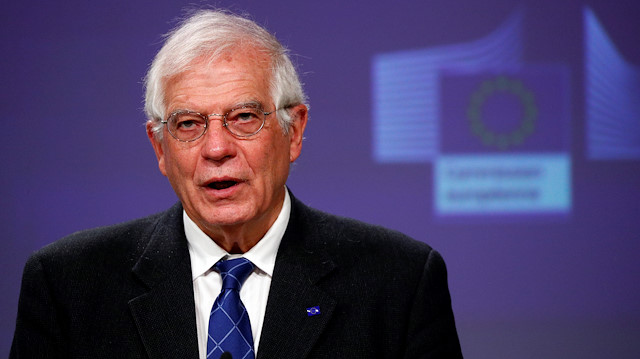

European High Representative for Foreign Affairs and Security Policy and Vice-President of the European Commission Josep Borrell.
New EU operation starts on Wednesday to monitor arms embargo, human trafficking, amid criticisms about its inefficiency
EU foreign ministers approved on Tuesday the launch of a new military mission, Operation IRINI, to monitor the UN arms embargo on Libya.
The new mission will operate in the air, sea, and through satellites to ensure that all countries respect the ban on providing arms for the parties involved in the Libyan conflict.
“Even in the time of coronavirus, the EU shows determination to promote peace on our neighborhood,” EU foreign policy chief Josep Borrell pointed out at a press conference on Tuesday.
The EU forces will also watch for the illegal oil exports, prevent human trafficking and contribute to the training of the local coast guard and navy, as a complementary task.
The new mission has already faced several criticisms.
In February, Italy, Austria, and Hungary asked for guarantees to ensure that the mission would be immediately suspended if it turned out to be a “pull factor” for illegal migration.
Sea operations of previous Operation SOPHIA, launched in 2015 to block irregular migration at the Mediterranean Sea, needed to be suspended due to disagreement between EU member states over asylum-seekers.
Borrell stressed that Operation IRINI would be different from the ending mission, and it would only have to prevent human trafficking as a complimentary task.
The EU has also been criticized for only patrolling the Mediterranean to prevent shipments of arms to Libya, while Libyan warlord Khalifa Haftar, continued to receive arms through Libya's land border with Egypt, according to various reports.
“IRINI is part of the solution, not the solution itself,” Borrell replied to journalists’ questions pointing out this controversy, admitting that it was not possible for the EU to launch a land mission as well.
Since the ouster of late ruler Muammar Gaddafi in 2011, two seats of power have emerged in Libya: warlord Haftar in eastern Libya supported mainly by Egypt and the United Arab Emirates, and the Government of National Accord (GNA) in Tripoli, which enjoys the UN and international recognition.
Libya's legitimate government has been under attack by Haftar's forces since last April and more than 1,000 people have been killed in the violence.
International efforts to enforce a cease-fire have proven unsuccessful in recent weeks due to persistent violations by Haftar’s forces.
#EU
#Operation IRINI
#Operation SOPHIA
#UN arms embargo in Libya

